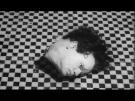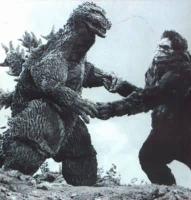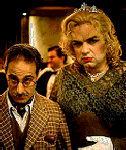
Considering David Lynch's 2003 DVD transfer of Eraserhead (1976), I am struck with the obsessive determination to achieve perfection that imbues every aspect of the effort. I have read that Lynch took control over the already-laborious restoration process, cleaning the film frame by frame, removing everything that was not a pure, straight-into-the-lens image. If the camera didn't see it, neither would the DVD viewer. And of course I am duly impressed by the result: The movie, which has always been a dark and shadowed thing, is nonetheless clear and deep on DVD. I've seen some gorgeous B&W on DVD, and Lynch matches the best, including some of The Criterion Collection's beautiful work--as well as Something Weird Video's fanatically frightening perfectionism for the happy dregs of exploitation movies. Even the marketing and packaging of Eraserhead mirrors this compulsion: you can buy it only from davidlynch.com (check out this site; in its own uneasily grimacing way, it too is The Happiest Place on Earth), which mails it to you in an ominous black box worthy of the Necronomicon (or a pair of top-of-the-line athletic shoes). The disc comes in an arresting, odd-sized (I assume so that it cannot rest comfortably with other DVDs) fold-out display case. The on-screen menu features a deleted scene in which Henry's pants-cuff gets entangled by some wire and indefinable drek--and what seems to be the infamous dead cat that Lynch procured from an understandably nervous veterinarian and took apart over a period of time, freezing it, I believe, between examinations. But I digress. This menu scene goes on for a creepily long time until we are presented with three unadorned options: the movie--without chapters, a Lynch trademark; no jumping around for you, you nosy home viewer--the trailer, and a commentary. The last involves David himself rambling on quite entertainingly about the years spent making the film, providing not only minute details of production but deadpan homespun yarns about food, driving, cat dissection, and so on--all overlaid, of course, with the distinct fascination of a fetish discovered. I hate to put it this way, but the whole affair is perfectly Lynchian.
Perfect, indeed; on the back of the DVD box the Woman in the Radiator assures us that "everything is fine in Heaven." Well, on one level we, the Lynch faithful, are indeed at last in Heaven. The arrival of Eraserhead on video--at least, video that isn't a pirated, murky mess--has been twenty-plus years in the making, and this Humble Viewer is suitably breathless. But how close do we get to Heaven while watching the film? For the sake of those who have not seen the movie, allow me to provide a brief synopsis (SPOILER WARNING--which you really don't have to worry about; plot is NOT why one watches this movie):
Henry X, a nervous, apprehensive, and uncertain young man, discovers that his girlfriend, Mary X, who is even more nervous, apprehensive, and uncertain, if that is possible, has had a baby--at least they think it's a baby. Reluctantly, Henry settles down with Mary and the "baby"--a special effect of eerie realism combined with the hysteria of denial (that's as close as I can get to a description, unless you're willing to accept "baby-sized truncated worm/sperm thing"); he then descends into a miserable fantasy world in which a seductive neighbor lady, small grimy objects, tiny worms, and a Woman in the Radiator--actually, behind the radiator, standing on a little stage, either sweetly singing or gleefully squishing falling worm/sperm things; I'm really trying to help you here--combine to alternately increase and alleviate (the latter unsuccessfully) the tension and eventual panic of marriage and fatherhood. The baby gets sick--loudly, wetly, relentlessly--Mary goes home to Mother, and Henry literally loses his head over the whole mess, first becoming a resource for pencil erasers and then finding himself drawn within the radiator, locked in a chaste embrace with the Woman. It ends in a blinding whiteout.
Where does all this come from? Well, there is an old Daffy Duck cartoon in which, as Duck Twacy, he is confronted with a number of villains, including one "Eraserhead," who announces, "I'm going to r-r-r-rub you out" (by the way, a line echoed somewhere--help me out, Humble Readers--in a Clash song). I'd like to think Lynch knows the Daffy cartoon (considering this is a man who once purchased a string of win-'em-at-the-carny-sized Woody Woopeckers); it would provide some comic relief from the unease that permeates most of the film. And maybe he does know the Daffy version; there is some comedy in Eraserhead, especially in Jack Nance's perfectly (that word again) controlled performance. His first scene has a Chaplinesque quality as he meanders through an industrial waste-landscape, skittering up and down dirt mounds, around--and in--puddles, and so on. His face, topped with that groundbreaking hairdo, seems plucked straight from a Mack Sennet comedy; I can see him as a hapless truant officer or innocent bystander, there only to await a brick on his head or pie in his face. There is also the Woman in the Radiator, who, despite her ghastly, deformed, Kewpie-doll simper, does sing beautifully; Lynch has reminded us time and again that the female upper register, so to speak, hath charms.
But I think the real source of Eraserhead is a deeply engrained, post-adolescent fear of adulthood, in which jobs--Henry, when asked what he does, replies that he's on vacation--marriage, and parenthood seem equivalent to a loss of freedom, youth, even life. Lynch captures this basic--perhaps we should admit adolescent--fear with repellent simplicity. I won't go into details, but there are a number of scenes--at Mary X's house, in Henry's apartment--in which emergent sexuality is seen not as fulfillment but as a trap; the snare is hairy, gooey, sweaty adulthood itself. This kind of sexual/body dread is taken up by David Cronenberg in the late '70s, and of course Lynch himself right after, beginning with The Elephant Man (1980), which also explores body issues, to put it mildly.
The fear Lynch dissects is in some ways an "American fear"; baby boomers especially have been encouraged to sustain adolescence indefinitely. There is an entire culture dedicated to campy, kitschy, self-conscious memorializing of the trivial minutiae of one set of "happy days" or another. I must admit I suffer from this as much as, if not more than, many. How else can I explain my minor satisfaction in hearing a Hanna-Barbera sound effect in a Ren and Stimpy cartoon--or my more-than-minor satisfaction in Ren and Stimpy themselves--or my covetous relationship with a small but prominently displayed collection of childhood toys--a few Matchbox cars, a tattered Popeye doll, a Wham-O Air Blaster--right in my living room, or my insistence that Ray Bradbury is one of the greatest writers who ever lived? (Although I might be right on that last one, if you squint a bit.) And let us not linger too long on the American attitude toward sexuality, at least as it is filtered through the lens of basic cable, which sees men as flatulent cholesterol-aholics who peer through life's peephole at Girls Gone Wild, and which asks women to perform for the peephole while indulging their own body-needs via conspicuous consumption--sometimes of men, a la "reality" TV (those weird Sadie Hawkins experiments in mating-as-a-game-show) but more often of cosmetics and cosmetic surgery.
Eraserhead expresses this fear as a nightmare, a wish-fulfillment of nauseating thoroughness, and in so doing edges us closer to not only awful understanding, to be sure, but also, to some extent, resolution. However. When Wordsworth--with, of course, lots more delicacy--examines the loss of childhood, he offers consolation via faith, communion--he uses the phrase, "primal sympathy"--and "years that bring the philosophic mind." He even seems determined to accept adulthood, asserting that he will not grieve over the loss of that "splendour in the grass," and is willing to accept "the light of common day." Lynch's resolutions, on the other hand, tend to occur in a perfected landscape, one often explicitly depicted as a kind of Heaven or childhood. (It's reverse Wordsworthian Romanticism; for Wordsworth, one begins in Heaven, "trailing clouds of glory," and ends up in an almost-equally glorious early childhood before entering a hopefully resolved adulthood in which one can, for instance, love a brook more so than when one could run as quickly as one.) Even death itself--as in The Elephant Man and (I think) Twin Peaks: Fire Walk With Me (1992) and Mulholland Drive (2001)--can become an entrance to childhood. John Merrick chooses to sleep like other people, particularly like the painting of the child that hangs above his bed. In so doing, he spells his doom, for to lie down is to stop that tortured breathing. But he finds rest, and his mother. Sailor in Wild at Heart (1993) bypasses biology and finds his fairy godmother. A robin, albeit an obviously mechanical one--more on that in the next paragraph--sings at the end of Blue Velvet (1986); the female voice once again rises in welcome in Mulholland Drive; and, shorn of his usual awful adornments, all the stars come out to shine on the reunited brothers in The Straight Story (1999).
I would suggest that Eraserhead, in its own slippery way, marks the recurring Lynchian desire to resolve adolescent dread without making the resultant adult irresolute. But if the means of resolution is childhood or death/entrance into Heaven, then the operating principle of resolution is surrender to innocence. Simply put (and at that word you may sigh or yelp your relief), the way to resolve adolescent dread is, as Springsteen says, to be "ready to grow young again." We're back in the radiator, Heaven, in which the morass of adolescence is cleared by a simple--but at its best not simple-minded--acceptance of innocence, though tempered by uncertainty: we return to the fake robin, the unmistakable whiff--sometimes reek--of irony in Lynch's tone. But I would argue that when his endings express uncertainty of the value of the innocence gained, it is a hesitation that does not negate his conviction that we need to be like little children. After I watched The Straight Story, I felt deeply justified for crying at the end of Lynch movies. I've always been one of those who feel that Lynch may be cruel, but he is not jaded. He knows how bad things can get, and he worries about this all the time. Scoff if you must, but he expresses toward his characters a parental level of concern, as well as helplessness. In Scorsese's The Last Temptation of Christ (1988), Jesus is asked if he loves humanity, and he replies that he pities it. The questioner comments that pity may be enough. At the least, it is indispensable to a tragedy worth the name; at the most, it can "build a Heaven in Hell's despite," to quote another master of irony, crazy Bill Blake, who also nonetheless tells straight stories, in his own way.
In reaching this point--where Eraserhead stands at the front of a long line of films that dip deeply into ugliness in order to extract, rescue, even reward anything that could remain innocent in all that "muck and mire," and does so with an unflinching but pitying gaze--I am reminded of Tom Kromer's semi-autobiographical, unforgettable book, Waiting for Nothing, which chronicles the harrowing experiences he and others suffered on the road during the Great Depression. In one vignette, he is in the lavatory of a mission flophouse with another "stiff," one who will soon blow out his brains in a toilet stall. During an exchange that over the years for me has become almost scriptural, the two agree, "She sure is a tough life, buddy." That expression of mutual pity shows up in the oddest places, including Kromer's flophouses, but also outside Lynch's kitchen windows, on his front porches, atop his car hoods--and even behind the occasional radiator.





